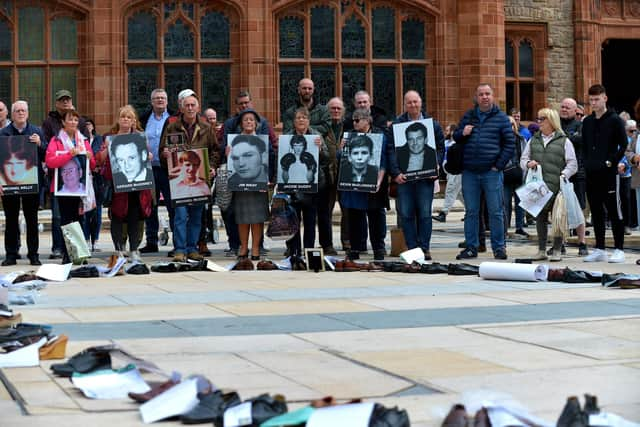Irish Government taking Britain to European Court of Human Rights over legacy act and amnesty provisions
and live on Freeview channel 276
The Tánaiste Micheál Martin confirmed on Wednesday that the government has decided to initiate an inter-State case against the United Kingdom under the European Convention on Human Rights over the controversial Northern Ireland Troubles (Legacy and Reconciliation) Act 2023.
The legislation was passed in the British Parliament and received the assent of Charles III of Great Britain and Northern Ireland in September despite the opposition of victims, and almost every political party that organises on the island of Ireland, with the exception of the British Conservative Party.
Advertisement
Hide AdAdvertisement
Hide AdThe legislation provides a de facto amnesty for British soldiers accused of carrying out atrocities during the conflict here and was introduced after the British Conservative Party’s 2019 manifesto promised to end prosecutions of British Army veterans.


In September Minister of State at the Department of Foreign Affairs, Deputy Sean Fleming, said an inter-State case against the UK at the ECHR would be a ‘very significant’ step and that the government was taking legal advice on such a move.
Today, the Tánaiste confirmed it will take a case against Britain and argue that the act’s provisions are incompatible with the UK’s obligations under the Convention.
“This decision was taken after much thought and careful consideration. I regret that we find ourselves in a position where such a choice had to be made,” he said.
Advertisement
Hide AdAdvertisement
Hide Ad

Mr. Martin said the British Government’s decision to introduce the act unilaterally and not to proceed with the legacy provisions of the 2014 Stormont House Agreement, including a cross-border Independent Commission on Information Retrieval, had left the Irish government with few options.
"The British Government removed the political option and has left us only this legal avenue. The incorporation of the ECHR into NI law is a specific and fundamental requirement of the Good Friday Agreement.
"Since the UK legislation was first tabled, the Government have been consistent that it is not compatible with the Convention. I used every opportunity to make my concerns known, and urged the British Government to pause this legislation.”
Foyle MP Colum Eastwood welcomed the development.
He said: “No political party or institution on this island supports the British Government’s approach to addressing the legacy of the past. This Tory government has passed the most extreme legislation that shuts down access to justice for victims and survivors who have been fighting for decades for the truth about what happened to their loved ones.
Advertisement
Hide AdAdvertisement
Hide Ad“The British Government has clearly undermined the international treaty entered into as part of the Stormont House Agreement, they have fought political leaders from every party in the North and they have set themselves against the needs of victims and survivors.
"The inter-state case being taken by the Irish Government is both welcome and utterly necessary.
“If the British Government will not respect the treaties it enters into, respect international law or respect the basic tenets of justice then it must be challenged robustly.”
Sinn Féin Leader Mary Lou McDonald also welcomed confirmation the decision to challenge the act.
Advertisement
Hide AdAdvertisement
Hide Ad“Victims and families have been stating from the outset that this cruel and shameful Act Is a flagrant breach of international human rights law.
“The British Tory Government rushed through this legislation despite the clear opposition and concerns raised by victims and families, all political parties, the Irish Government, the US, UN, the Council of Europe and human rights experts.
“It is a blatant attempt to shut the door on families' efforts to achieve truth and justice through the courts and to give an amnesty to British state forces involved in the murder of, and serious human rights violations against, Irish citizens.
"Heartbroken families have been fighting for years, determined to get truth and justice for their loved ones.”
Advertisement
Hide AdAdvertisement
Hide AdIn his statement on Wednesday the Tánaiste said: “I have consistently adopted a victims-centred approach to this issue. We are not alone in our concerns.
"Serious reservations about this legislation have also been raised by a number of international observers, including the Council of Europe’s Commissioner for Human Rights and the UN High Commissioner for Human Rights.
"Most importantly, this legislation is opposed by people in NI, especially the victims and families who will be most directly impacted by this Act.
“In particular, we have concerns around provisions which allow for the granting of immunity, and which shut down existing avenues to truth and justice for historic cases, including inquests, police investigations, Police Ombudsman investigations, and civil actions.
Advertisement
Hide AdAdvertisement
Hide Ad"Even in cases in which immunity is not granted, ‘reviews’ by the proposed body, the Independent Commission for Reconciliation and Information Recovery (ICRIR) are not an adequate substitute for police investigations, carried out independently, adequately, and with sufficient participation of next of kin.
“The British Government enacted this legislation on September 18, 2023, shutting off any possibility of political resolution.
“We now find ourselves in a space where our only recourse is to pursue a legal path.
“It is important to leave the next steps to the Court.”
Under Article 33 of the ECHR any contracting party to the Convention can refer any alleged breach by another contracting party in what are known as inter-State cases.
Advertisement
Hide AdAdvertisement
Hide AdSince the ECHR entered into force in 1953 over 30 inter-State cases have been brought.
At present there are some 14 inter-State cases pending before the ECHR.
Ireland previously initiated an inter-State case against the UK on December 16, 1971
In its judgment, delivered on January 18, 1978, the ECHR held that certain techniques of interrogation used by the British forces constituted a practice of inhuman and degrading treatment, but not torture, within the meaning of Article 3 ECHR.
Advertisement
Hide AdAdvertisement
Hide AdIreland subsequently applied to revise the Court’s judgment, which application was dismissed by decision of March 20, 2018.
The ‘Journal’ has asked the Northern Ireland Office (NIO) for a response to the Tánaiste’s statement.